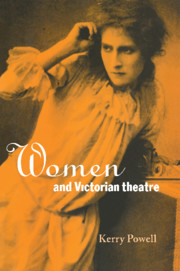5 - Textual assaults: women's novels on stage
Published online by Cambridge University Press: 06 November 2009
Summary
To myself no payment, not the greatest, could in any way really compensate for the annoyance and the injury…
(Ouida, 1882, protesting in a letter to The Times against a male playwright's unauthorized adaptation of a novel of hers for production on stage)No middle-class Victorian woman, as the previous chapter has shown, could realistically hope to support herself by writing plays. Of the hundreds of nineteenth-century plays written by women, none survives today as part of the literary or dramatic canon, and only a few were critically acclaimed or commercially successful in their own time. Fiction, of course, was another matter. Written and consumed in a domestic setting, remote from the public spectacle of theatre, fiction provided an opportunity for women writers to conform to Victorian conceptions of femininity while pursuing a career of their own.
As Gaye Tuchman reveals in Edging Women Out, perhaps as many as half of all early Victorian novelists were women; and although their rewards as novelists diminished in the later Victorian period as men wrote more fiction themselves, women remained numerous in the growing list of novelists throughout the nineteenthth century and beyond. As Tuchman points out, writing fiction was one of the “few acceptable ways” in which women could earn a living. As in the teaching profession, if not to the same extent, women dominated the early Victorian novel–so much so that men more often wrote under female names than women adopted male pen names. But by the 1880s more women were assuming a male persona, indicating, as Tuchman says, that “later cultural expectations emphasized that novelists were mainly men.”
- Type
- Chapter
- Information
- Women and Victorian Theatre , pp. 95 - 121Publisher: Cambridge University PressPrint publication year: 1997



